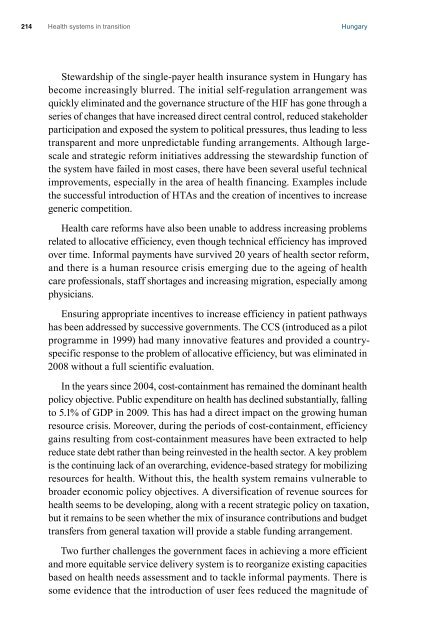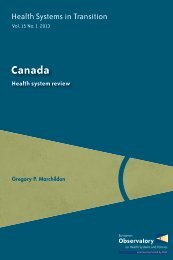Health Systems in Transition - Hungary - World Health Organization ...
Health Systems in Transition - Hungary - World Health Organization ...
Health Systems in Transition - Hungary - World Health Organization ...
You also want an ePaper? Increase the reach of your titles
YUMPU automatically turns print PDFs into web optimized ePapers that Google loves.
214<br />
<strong>Health</strong> systems <strong>in</strong> transition <strong>Hungary</strong><br />
Stewardship of the s<strong>in</strong>gle-payer health <strong>in</strong>surance system <strong>in</strong> <strong>Hungary</strong> has<br />
become <strong>in</strong>creas<strong>in</strong>gly blurred. The <strong>in</strong>itial self-regulation arrangement was<br />
quickly elim<strong>in</strong>ated and the governance structure of the HIF has gone through a<br />
series of changes that have <strong>in</strong>creased direct central control, reduced stakeholder<br />
participation and exposed the system to political pressures, thus lead<strong>in</strong>g to less<br />
transparent and more unpredictable fund<strong>in</strong>g arrangements. Although largescale<br />
and strategic reform <strong>in</strong>itiatives address<strong>in</strong>g the stewardship function of<br />
the system have failed <strong>in</strong> most cases, there have been several useful technical<br />
improvements, especially <strong>in</strong> the area of health f<strong>in</strong>anc<strong>in</strong>g. Examples <strong>in</strong>clude<br />
the successful <strong>in</strong>troduction of HTAs and the creation of <strong>in</strong>centives to <strong>in</strong>crease<br />
generic competition.<br />
<strong>Health</strong> care reforms have also been unable to address <strong>in</strong>creas<strong>in</strong>g problems<br />
related to allocative efficiency, even though technical efficiency has improved<br />
over time. Informal payments have survived 20 years of health sector reform,<br />
and there is a human resource crisis emerg<strong>in</strong>g due to the age<strong>in</strong>g of health<br />
care professionals, staff shortages and <strong>in</strong>creas<strong>in</strong>g migration, especially among<br />
physicians.<br />
Ensur<strong>in</strong>g appropriate <strong>in</strong>centives to <strong>in</strong>crease efficiency <strong>in</strong> patient pathways<br />
has been addressed by successive governments. The CCS (<strong>in</strong>troduced as a pilot<br />
programme <strong>in</strong> 1999) had many <strong>in</strong>novative features and provided a countryspecific<br />
response to the problem of allocative efficiency, but was elim<strong>in</strong>ated <strong>in</strong><br />
2008 without a full scientific evaluation.<br />
In the years s<strong>in</strong>ce 2004, cost-conta<strong>in</strong>ment has rema<strong>in</strong>ed the dom<strong>in</strong>ant health<br />
policy objective. Public expenditure on health has decl<strong>in</strong>ed substantially, fall<strong>in</strong>g<br />
to 5.1% of GDP <strong>in</strong> 2009. This has had a direct impact on the grow<strong>in</strong>g human<br />
resource crisis. Moreover, dur<strong>in</strong>g the periods of cost-conta<strong>in</strong>ment, efficiency<br />
ga<strong>in</strong>s result<strong>in</strong>g from cost-conta<strong>in</strong>ment measures have been extracted to help<br />
reduce state debt rather than be<strong>in</strong>g re<strong>in</strong>vested <strong>in</strong> the health sector. A key problem<br />
is the cont<strong>in</strong>u<strong>in</strong>g lack of an overarch<strong>in</strong>g, evidence-based strategy for mobiliz<strong>in</strong>g<br />
resources for health. Without this, the health system rema<strong>in</strong>s vulnerable to<br />
broader economic policy objectives. A diversification of revenue sources for<br />
health seems to be develop<strong>in</strong>g, along with a recent strategic policy on taxation,<br />
but it rema<strong>in</strong>s to be seen whether the mix of <strong>in</strong>surance contributions and budget<br />
transfers from general taxation will provide a stable fund<strong>in</strong>g arrangement.<br />
Two further challenges the government faces <strong>in</strong> achiev<strong>in</strong>g a more efficient<br />
and more equitable service delivery system is to reorganize exist<strong>in</strong>g capacities<br />
based on health needs assessment and to tackle <strong>in</strong>formal payments. There is<br />
some evidence that the <strong>in</strong>troduction of user fees reduced the magnitude of
















